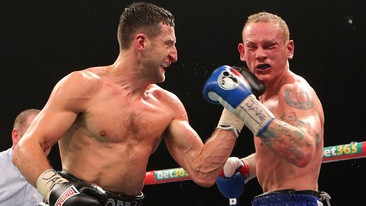 Froch-Groves II - The Latest Rematch
Froch-Groves II - The Latest Rematch After the Froch-Groves rematch some time back, I was asked by many people why boxing rematches are so common. The concept of a rematch clause or negotiated rematch is one that many sports do not encounter because of centrally governed bodies. Rematches occur naturally when these bodies exist and contracts do not have to be recurrently drawn up. Very rarely do rematches, or indeed any encounters, occur naturally in boxing.
There is probably a blend of sporting and economic reasons that ensure rematches occur in boxing. The sporting ones include a boxers desire to right a wrong or to correct for a poor performance while economic ones may include the mutual monetary benefits of a rematch and the need to diminish the effect of a previous defeat to invest in ones reputation for future big fights. A champion can reduce the risk of losing a title for a prolonged period by including a rematch clause if they lose and is really a means by which a champion can insure against the loss of future earnings.
In the most recent high profile rematch, Carl Froch once again defeated Georges Groves albeit a lot more convincingly this time. In weeks previous, Manny Pacquiao overcame Timothy Bradley, which many believed to be the correction of a controversial and some would say poorly judged first match.
If we assume that both fighters are of similar elite level (rematch clauses would generally not be applied to lower level opposition), generally if the champion loses the fight, they will have the right to invoke a rematch upon loss. If the rematch is not granted a fighter may be taken to court or can potentially be stripped of any titles by the governing body in question. There seems to be distinct reasons for the inclusion of the clause depending on the fighter. When defeated in a huge shock knockout in 2001 to Hashim Rahman, Lennox Lewis was forced to go to court to invoke the clause. He subsequently regained the heavyweight championship. This case is an example of a straightforward champion wanting to regain his title in light of an unexpected result.
Another example is Scottish lightweight Ricky Burns who lost his world title to Terence Crawford. Although insisting he does want a rematch, many analysts believe any repeat of the first fight would detrimentally affect his value as a prize-fighter and thus the rematch clause should not be invoked in this case.
An unusual case of a winner wanting a rematch clause invoked was that of Timothy Bradley who won his first bout with Pacquiao. He was so distraught by criticism of his controversial victory levelled at him he wished to prove his critics wrong by beating Pacquiao again. The economic motives of fighting the much followed Pacquiao surely played a significant role too. Unfortunately for him he lost the rematch.
Arguably the greatest of his generation, Floyd Mayweather Jr insists on rematch clauses. A recent opponent Robert Guerrero, when asked about the rematch clause that Floyd Mayweather insisted upon, said it showed him “where his head is”. In a sport like boxing, the admittance of even the potential of defeat by a champion can give a challenger a
psychological edge.
Rematches can also be negotiated. As can be seen historically, they have gone some way in cementing the legacy of fighters. Perhaps relying on each other is not only a lucrative tactic but also a means to strengthen ones place in the sport. Rematches generate interest through the formation of a rivalry which can be difficult to create in a sport where once off opponents are more common. Part of the success of Froch-Groves II can certainly be attributed to this. Manny Pacquiao- Juan Manuel Marquez (4 fights), Israel Vasquez – Rafael Marquez (4 fights), Arturo Gatti –Micky Ward (3 fights) Erik Morales – Antonio Barrera (3 fights), Muhammad Ali –Joe Frazier (3 fights), Roberto Duran- Sugar Ray Leonard (3 fights) are just some examples of great multiple fight rivalries.
What is the net effect of a rematch clause in economic terms? Research has been conducted on this question. In Rematches in Boxing and Other Sporting Events, J. Atsu Amegashie and Edward Kutsoati look at the incentive effects of rematches, particularly in professional boxing and found that if there was a high chance (mandatory) of a rematch or very low chances of rematches it generated greater aggregate effort. In reality however as most elite boxers need other elite boxer’s, chances are rematches are quite high without any clauses.
 RSS Feed
RSS Feed